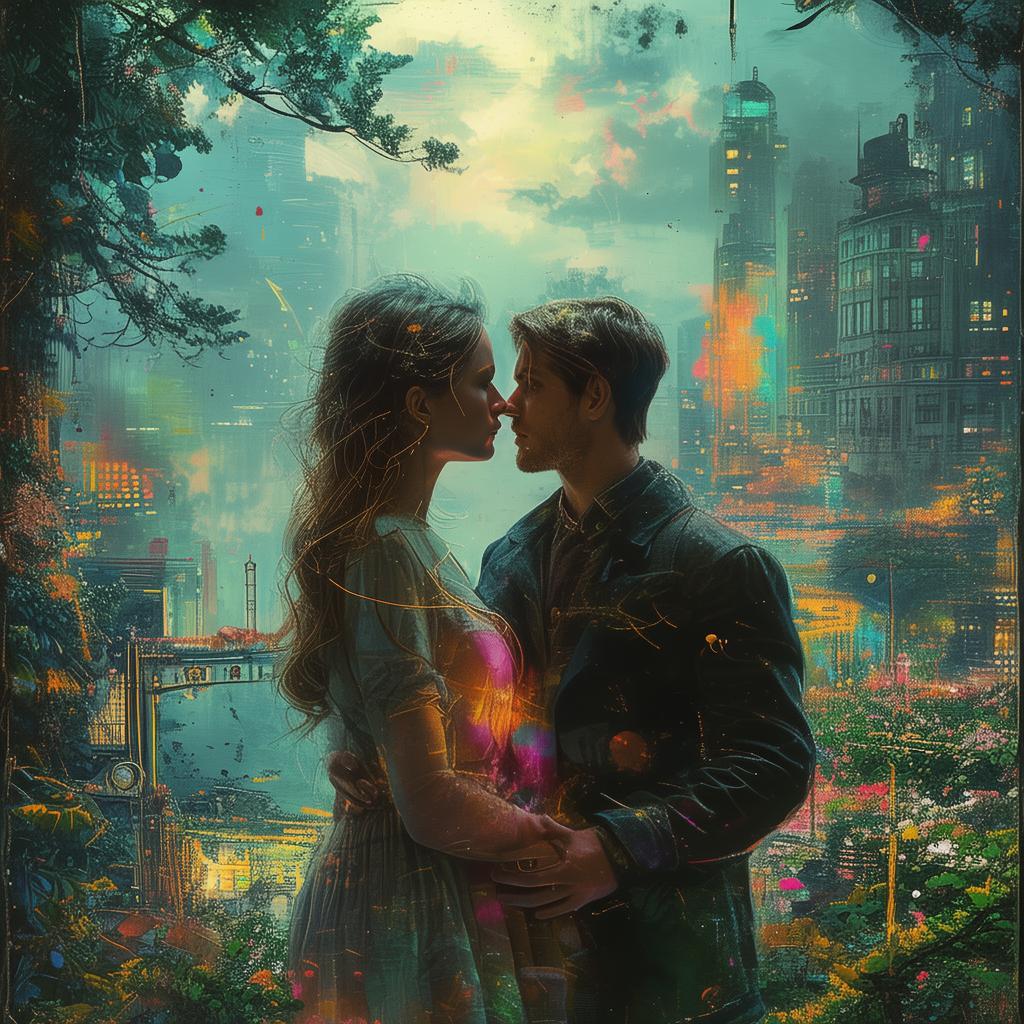Heir of the Pharaoh's Heart: The Brahmin's Forbidden Love
In the shadow of the grand pyramids, where the air was thick with the scent of incense and the whispers of the gods, there lived a Brahmin named Rama. His life was a tapestry of rituals and devotion, a path that had always been clear. Yet, in the heart of the land of the Pharaohs, fate had woven a thread that defied all expectations.
Rama had traveled from far-off India, a scholar of the ancient Vedas, to the court of the Pharaoh. His mission was to decipher the enigmatic prophecies that spoke of a great love that would unite the two lands, but his heart had found its own purpose in the form of the Pharaoh's daughter, Amon-Ra.
Amon-Ra was no ordinary princess. She was a beacon of beauty and wisdom, her eyes a deep blue like the Nile itself. She had been betrothed to the prince of a neighboring kingdom, a union that would secure the peace between their realms. Yet, her heart yearned for something more, something that no one in her kingdom could comprehend.
It was during a rare moment of solitude in the royal gardens, where the moonlight danced upon the water of the reflecting pond, that Rama first laid eyes upon her. She was a vision, her presence a silent siren call to the Brahmin's soul. Their first conversation was a silent exchange of glances, a connection that transcended words.
As days turned into weeks, their meetings grew more frequent, their exchanges more intimate. Amon-Ra, with her fiery spirit and her longing for freedom, found in Rama a kindred soul. Together, they shared dreams of a world beyond the constraints of their respective kingdoms, a world where love was not a barrier but a bridge.
Yet, as Rama's love for Amon-Ra deepened, so too did the shadows of their forbidden love. The prince, a man of honor and duty, was determined to fulfill his betrothal. The Brahmin, who had once seen the world through the lens of his sacred texts, now found himself entangled in a tapestry of deceit and betrayal.
The Pharaoh, a man of many faces, was not blind to the love that blossomed between his daughter and the foreigner. He was a man of power and wisdom, but also a man who understood the weight of prophecy. He saw the connection between Rama and Amon-Ra as a sign of the great union foretold by the gods, but he also knew that to embrace it would be to risk everything.
As the threads of their love became entwined with the political machinations of the court, the stakes rose higher. The Brahmin's devotion to Amon-Ra was tested when he was summoned to decipher a new prophecy, one that spoke of a great betrayal from within the royal family.
Rama's heart was torn as he stood before the Pharaoh, the weight of the prophecy upon his shoulders. He knew that his love for Amon-Ra was not just personal; it was part of a larger narrative, one that would shape the fate of two nations. He knew, too, that the betrayer was not far from him, watching, waiting.
The prince, who had once been a symbol of peace, became a threat. His jealousy and his love for Amon-Ra turned him into a man of dark intentions. He was willing to sacrifice his own kingdom, to see Amon-Ra with Rama, even if it meant war.

The Brahmin, torn between his love and his duty, sought guidance in the ancient texts. He found within them a passage that spoke of love that could not be contained by walls, of hearts that could transcend time and space. He knew then that his love for Amon-Ra was a flame that could not be extinguished.
As the day of the great festival of the gods approached, when the fate of the two kingdoms would be decided, Rama and Amon-Ra found themselves in the midst of a web of lies and danger. The Brahmin's heart raced as he realized that the betrayal was closer than he had ever imagined.
In a moment of truth, Rama confronted the prince, a man who had become a stranger to the love that had once defined him. Amon-Ra, her spirit unbroken, stood by Rama's side, her eyes reflecting the fire of her love.
The prince, seeing the truth of their love, realized that he could no longer stand in their way. With a heavy heart, he stepped aside, allowing the union to take place. The Pharaoh, a man who had seen the love between Rama and Amon-Ra as a sign of the gods, gave his blessing.
As the sun set over the land of the Pharaohs, casting a golden glow over the grand pyramids, Rama and Amon-Ra stood hand in hand, their love an unstoppable force. The Brahmin's forbidden love with the Pharaoh's daughter had defied the odds, proving that love is not bound by the walls of kingdoms or the constraints of prophecy.
The two lovers walked away from the court, into the unknown future that awaited them. They were no longer just a Brahmin and a princess; they were a testament to the power of love, a force that could unite even the most divided hearts.
✨ Original Statement ✨
All articles published on this website (including but not limited to text, images, videos, and other content) are original or authorized for reposting and are protected by relevant laws. Without the explicit written permission of this website, no individual or organization may copy, modify, repost, or use the content for commercial purposes.
If you need to quote or cooperate, please contact this site for authorization. We reserve the right to pursue legal responsibility for any unauthorized use.
Hereby declared.









